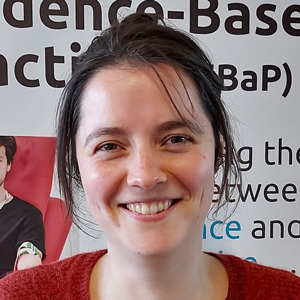The importance of knowledge translation (and trust) in polycrisis times
Author: Tine D'aes1,2, Jorien Laermans1,2, Emmy De Buck1,2
In an era marked by interconnected social, economic, and ecological crises, effective knowledge translation is more important than ever. Disseminating evidence-based information in ways that are easily understood is vital for tackling the complex challenges we face today. In this blog, we describe how we at Cochrane First Aid organized a workshop at the recent Global Evidence Summit in Prague to provide participants with the necessary skills and tools for effective evidence dissemination. We also discuss how, in addition to disseminating trustworthy evidence, ensuring that people trust this reliable information when they encounter it may be one of the primary challenges the evidence-based community will face in the coming years.
The importance of knowledge translation in times of polycrisis
The term “polycrisis” refers to the simultaneous occurrence of multiple, interconnected crises that collectively have a more severe impact than any single crisis alone. This concept has gained prominence as we face the combined effects of the COVID-19 pandemic, climate change, geopolitical tensions, and economic instability.1 These crises interact with and exacerbate each other, creating a complex web of challenges that require coordinated responses.
During a polycrisis, when quick and effective decisions are required, having access to clear and actionable evidence can make a significant impact. Knowledge translation transforms complex health research findings into understandable information that can be used by policymakers, health care providers, caregivers, patients, and the general public. Cochrane defines it as the process of facilitating the use of health evidence from systematic reviews by those who need it to make health decisions. This involves prioritizing review topics, collaborating with stakeholders, producing evidence in various formats (e.g., blogshots, podcasts, or videos), translating it into multiple languages, and disseminating it through different channels.2 Ultimately, it ensures that the best available evidence informs decisions, leading to more effective interventions and policies.
A distinction can be made between the dissemination of “evidence” and the dissemination of “evidence syntheses.” Evidence synthesis organizations such as Cochrane have a responsibility to inform and raise awareness about the difference in reliability between individual studies and evidence syntheses such as systematic reviews. Synthesizing evidence is crucial for obtaining the most accurate and reliable overview of the current knowledge on a specific topic.
Sharing expertise to create evidence dissemination champions
Our hands-on workshop at the Global Evidence Summit in Prague aimed to provide researchers and review authors with tools for effective evidence dissemination, with a focus on evidence syntheses. During this workshop, we brought together experts and participants from various fields to explore practical strategies for translating evidence into action, in collaboration with co-facilitators from Cochrane Pre-hospital and Emergency Care, Cochrane Rehabilitation, Cochrane Nutrition and Physical Activity, JBI, and eBASE Africa.
The workshop provided a platform for sharing tools, tips, and tricks for planning and executing effective evidence dissemination. During a subsequent interactive session, participants were guided through the creation of their own dissemination plans and were able to ask questions on creating different dissemination products. The hands-on approach of the workshop was meant to ensure attendees left with practical resources they could immediately apply to their work.
As our workshop underscored, effective knowledge translation involves more than just sharing information: it requires tailoring messages to different audiences, using appropriate channels, and engaging stakeholders in meaningful ways. For this reason, exchanging expertise, tips, and tricks, as we did during the workshop (and its preparation), is vital in empowering individuals who can help build a broader basis of trust.
We believe that such efforts are especially important in current times.

Workshop on effective evidence dissemination at the recent Global Evidence Summit. Photo by Stefano Negrini of Cochrane Rehabilitation.
The challenges of artificial intelligence and mistrust
While digital transformation has made reliable information more accessible to people worldwide than ever before, it also introduces new challenges and threats. Distinguishing reliable from unreliable information has become increasingly difficult. While our workshop focused on using human brainpower to produce dissemination plans and products, we cannot ignore the ongoing technological revolution that surrounds us.
During a time characterized by growing mistrust and the spread of disinformation, the rise of artificial intelligence (AI) probably presents at least as many challenges as opportunities. While AI holds enormous potential for knowledge translation and evidence dissemination, and is increasingly used as an aid in producing texts and images on demand, the risks linked to AI are paramount. Generative AI systems are prone to hallucinations and biases, posing a real danger when used as search engines or sources of information—roles many of them were not designed for. Additionally, AI can be used to produce disinformation, including realistic fake content (deepfakes). It can also be used to target specific groups by exploiting their biases and preferences, making such disinformation more effective and harder to counter. This can erode trust by inducing a widespread skepticism of all information.3 At the same time, AI systems can be part of the solution to the problems they pose. They can help detect and moderate misinformation or deepfakes, and assist in fact-checking.

Image created by DALL-E 3 in response to a prompt about the risks of AI related to disinformation.
Evidence synthesis organizations such as Cochrane, JBI, and Campbell are also faced with mistrust, despite their rigorous work. The complexity of their methodologies and the technical nature of their publications can make it difficult for the general public to understand and trust their findings. Ironically, as highlighted during our workshop by Cochrane Nutrition's Celeste Naude, people who spread disinformation sometimes seem to be better at reaching a broad audience than we are. Therefore, simplifying and effectively communicating our processes and results is essential. Additionally, the dynamic nature of scientific research means that recommendations can change as new evidence emerges, which can be confusing and lead to mistrust if not communicated effectively. Building and maintaining trust requires ongoing engagement with a wide range of stakeholders, including policymakers, health care providers, and the public. Journalists and social media content moderators also share a responsibility not to undermine trust in these organizations. For example, earlier this year, Cochrane Sweden was wrongly suspended from X after they were reported by unknown users, in the wake of a report they published on the (lack of) transparency of clinical trials held in Nordic countries. As Cochrane CEO Catherine Spencer stated, this case highlighted once again that "social media rules aimed at preventing misinformation are being used to do the exact opposite."4
Through continuous efforts to enhance transparency, improve communication, manage conflicts of interest, and engage with stakeholders effectively, evidence-based organizations can strengthen their credibility and maintain trust in their valuable work. Effective knowledge translation is crucial in attaining these goals.
Looking ahead
As highlighted throughout this blog, effective knowledge translation is essential for addressing the complex challenges of our time. Evidence-based organizations must focus on enhancing the accessibility of evidence-based information and stay innovative in their communication strategies. Disseminating evidence in transparent, easy-to-understand, and engaging ways will be key to fostering trust and ensuring that evidence-based practices are effectively implemented. Fact-checking and proactive communication may be necessary to combat misinformation. At the same time, leveraging technological advancements such as AI, while mitigating its risks, will be crucial.
At Cochrane First Aid, we are committed to making reliable first aid information accessible to all, by continuing to provide understandable and digestible pieces of evidence such as blogshots and visual abstracts in multiple languages. We will continue to disseminate key messages through social media campaigns and host workshops related to knowledge translation. Furthermore, by collaborating with other Cochrane groups, and with other evidence synthesis organizations such as JBI and Campbell,5 we will keep sharing expertise and resources, and exchange insights on “what works.” Through our connections at Cochrane First Aid and the Centre for Evidence-Based Practice of Belgian Red Cross, for example with the International Federation of Red Cross and Red Crescent Societies, we aim to further engage with local communities to better understand their specific needs and tailor content accordingly, and encourage community members to participate in creating and reviewing content to ensure it is relevant and applicable in practice.
By continuously adapting and improving our approaches while continuing to exchange expertise among each other, we can better equip people to decide what to trust and make informed decisions in an increasingly complex world.
Key take-home messages
- Effective knowledge translation is crucial: in times of a polycrisis, translating complex research into practical, understandable information is essential for making informed decisions and implementing effective interventions.
- Sharing expertise and tools for dissemination: practical workshops and opportunities for exchanging knowledge are vital to equip as many people as possible with the tools for disseminating evidence. Furthermore, campaigns aimed at the general public can help people to recognize trustworthy information.
- Innovations offer both opportunities and challenges: technologies such as AI and social media can revolutionize evidence dissemination, but also pose risks related to dis- and misinformation. Balancing these aspects is key.
- Fostering trust as a priority: to build and maintain trust, evidence synthesis organizations should focus on transparency, clear communication, and active stakeholder engagement.
References
1. Tooze, A. (2023). This is why 'polycrisis' is a useful way of looking at the world right now. World Economic Forum. https://www.weforum.org/agenda/2023/03/polycrisis-adam-tooze-historian-explains/
2. Cochrane Community. Knowledge Translation. https://community.cochrane.org/review-development/knowledge-translation
3. Ryan-Mosley, T. (2023). How generative AI is boosting the spread of disinformation and propaganda. MIT Technology Review. https://www.technologyreview.com/2023/10/04/1080801/generative-ai-boosting-disinformation-and-propaganda-freedom-house/
4. Cochrane (2024). Cochrane Sweden wrongly suspended from social media platform X. https://www.cochrane.org/news/cochrane-sweden-wrongly-suspended-social-media-platform-x
5. Jordan, Z., Welch, V., & Soares-Weiser, K. (2024). Unlocking the power of global collaboration: building a stronger evidence ecosystem together. Cochrane Database of Systematic Reviews, 4, ED000166. DOI: 10.1002/14651858.ED000166
To link to this article - DOI: https://doi.org/10.70253/UUWI4943
Links to additional resources
https://firstaid.cochrane.org/
Disclaimer
The views expressed in this World EBHC Day Blog, as well as any errors or omissions, are the sole responsibility of the author and do not represent the views of the World EBHC Day Steering Committee, Official Partners or Sponsors; nor does it imply endorsement by the aforementioned parties.
